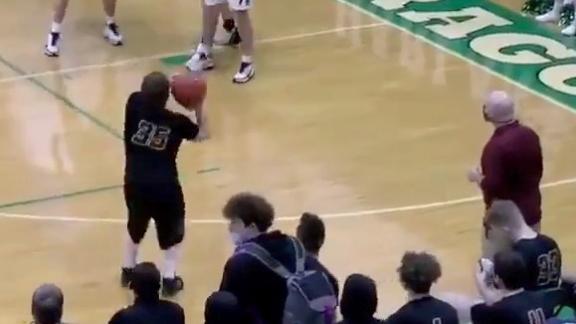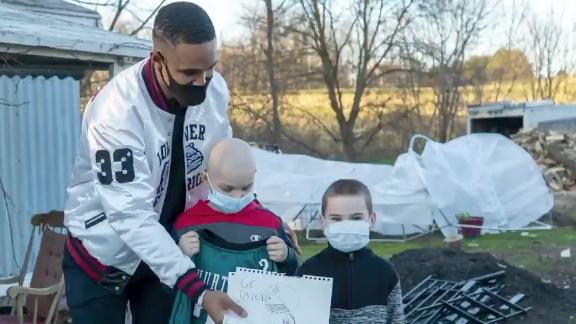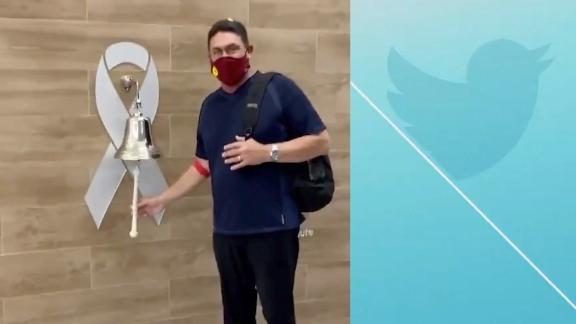Sonya Lamonakis, pictured above, left, is a 36-year-old elementary school teacher in Harlem who moonlights as a professional boxer. Despite her humble attitude and constant referral to her sport as a "hobby," Lamonakis is a top-five-rated female heavyweight who is being groomed for a title shot. She'll be in action against GiGi Jackson April 16 on the undercard of the Andre Berto-Victor Ortiz fight at the Foxwoods Resort Casino in Mashantucket, Conn., but she took time to speak to espnW from a back office at Gleason's Gym after finishing two hours of training, which came after a full day's work in the classroom.
espnW: Are you a teacher who boxes or a boxer who teaches?
Sonya Lamonakis: Boxing is my hobby. Teaching is my career. I obviously have to balance both. I work for the New York City Department of Education, so I'm at work every day. Then when I get out of work, I jump in my car and come to the gym. It takes a lot of time to do both.
espnW: At some point do you think you'll have to choose?
SL: No. I can do both. [Promoter Lou] DiBella has been very good. He knows he has to work with my schedule a little bit. I can't just drop everything, pull out and go to any fight. I need to get time off work. I try to arrange it far enough in advance that I can get everything I need to get done [in the classroom] so it doesn't affect my work, because I didn't go to college for six years to be a boxer. I went to college to be an educator, because that's what I'm going to be doing the rest of my life. Boxing's not going to be forever. Women don't make enough money to make a living at boxing.
espnW: You had a problem because your pro debut was in Worcester, Mass., on a school night.
SL: That is correct. After I knocked the girl out, I hung out for about half an hour. Then I jumped in my car and drove back to New York City to be at work for Friday morning.
espnW: Have you ever had to turn down a fight because it was a school night?
SL: In February, when DiBella had a show televised on Broadway Boxing at BB Kings [in New York City], he asked me to be on the card. I couldn't, because I had made a promise to the kids. I was actually going to take them to a show. I already made these plans like three months ago. So I told him I had a commitment to the kids, to my students, and I just couldn't disappoint them.
espnW: What was the show?
SL: It was Aesop's Fables, but set in Harlem. They remade the stories from African-American kids' perspective. Kids were rapping fables. It was Harlem-style.
espnW: What do your students think of your boxing career?
SL: I've been teaching middle school for many years. This is my first year in a K-to-5 school, so I'm used to having older kids. A couple of them, their parents come to the fights, but the kids can't really afford the tickets, usually, when I fight at either Madison Square Garden for the Golden Gloves [which Lamonakis won a record four years in a row] or pro fights. The pro fights are expensive for them, but a couple of them went to the Garden when I fought there, which was nice.
espnW: And do you bring your Golden Gloves in to class?
SL: Yes. I let them each wear the gloves, and they get to wear the belt and carry it around. They think they're all stars for like five minutes each.
espnW: Does a second career as a pro fighter help with discipline in the classroom?
SL: All the kids are great kids. They just don't make good choices all the time, you know? Before I started boxing, when I was teaching, I didn't have the problem with discipline in the classroom. I just have a zero-tolerance policy. I lay it down and lay into them the first couple months. I'm always their enemy before I'm their friend, and by November, they love me and we have a great relationship. A lot of teachers make the mistake of being their friend [first]. You've got to be their enemy first, and then become their friend.
espnW: How do the school administrators react to having one of their teachers boxing in her spare time?
SL: My assistant principal has been following me since I was fighting in the Golden Gloves. She came to Madison Square Garden to see me in the finals. She comes out to Foxwoods with her husband, who loves boxing. So she's been really supportive of it.
espnW: You were late to the game for a boxer, is that right?
SL: I was almost 28 when I started in amateurs. I'd always played sports in college [Lamonakis was on the field hockey and softball teams at Springfield College], and I just wanted something competitive. I was at the gym one day, and someone said I should try boxing. I went in there and just fell in love with the sport. And here I am, eight years later.
espnW: Thirty-four is an age when many fighters hang it up, not make their pro debut. Why did you wait so long to turn pro?
SL: A couple reasons. I wanted to get experience in the amateurs to be a fighter that wasn't just going to burn out quickly in the pros. I wanted enough experience that I was confident in my ability to stand in the pros.
espnW: Your first fight was against a 21-year-old, and you knocked her out. You've also beaten a 23-year-old. How does a 36-year-old compete with young kids?
SL: I don't think age matters. Those girls didn't have any amateur experience. The only pro opponent I ever saw in amateurs was the one I just beat [in mid-March], Tanzee Daniel. We were rivals. I beat her at the Garden in amateurs. I don't think the age is really a factor. I fought amateur for seven years. I had 31 fights. It's not easy for heavyweight women to get fights. I just think experience in boxing makes a big difference. You get the kinks out in the amateurs. You learn how to be a poised fighter. All the good pro men now have all had a great amateur background.
espnW: How about the pro women?
SL: The woman who has the belt in my category, Gwendolyn O'Neil, is OK, but she doesn't have the boxing experience I have. I had more fights as an amateur than she's had as an amateur and pro. I hopefully will get the chance to fight her one day. I'm not intimidated by her at all.
espnW: In a quote of yours from The Boston Globe, you said, "Women were not made to box. Their skulls are skinnier. Their hips and stomachs were made to reproduce, not to get hit." How do you explain what you're doing now, if that's your mentality?
SL: (Laughs) I do feel like combat sports aren't made for women. They're really not. And women's bodies aren't made for combat sports. Their strength is in their lower bodies. Their skulls really are thinner. I mean, the Bible says women were made from a man's rib. I don't know. It just happens to be something I do, and I'm OK at it. So I guess that's just going to be what I do.
espnW: You've called boxing a hobby and just said "I guess it's what I'm going to do." Some fighters would say that going into the ring with such a noncommittal attitude is dangerous. How would you respond to that?
SL: It's not really an attitude. I have a lot of life experience, and I'm knowledgeable. I have something to fall back on if something happens to me in the ring. A lot of boxers have to fight to survive. They need that income. I don't need that income. I have a job. I went to college to have a career. I box because I love the sport, and it is my hobby. So it's a little different for me than it is for anybody else. Any other fighter that works and has a career maybe understands that.




